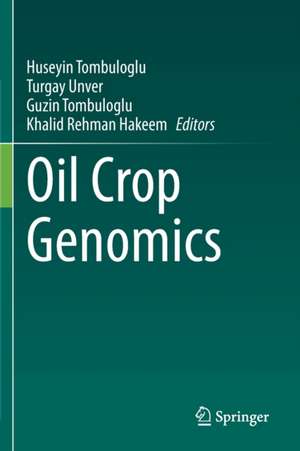Oil Crop Genomics
Editat de Huseyin Tombuloglu, Turgay Unver, Guzin Tombuloglu, Khalid Rehman Hakeemen Limba Engleză Paperback – 22 sep 2022
There is, however, no book that covers the genomes and genomics of oil crops. For this reason, in this volume we collected the most recent knowledge of oil crop genomics for researchers who study oil crop genomes, genomics, biotechnology, pharmacology, and medicine. This book covers all genome-sequenced oil crops as well as the plants producing important oil metabolites. Throughout this book, the latest genomics developments and discoveries are highlighted as well as open problems and future challenges in oil crop genomics. In doing so, we have covered the state-of-the-art of developments and trends of oil crop genomics.
| Toate formatele și edițiile | Preț | Express |
|---|---|---|
| Paperback (1) | 1115.77 lei 6-8 săpt. | |
| Springer International Publishing – 22 sep 2022 | 1115.77 lei 6-8 săpt. | |
| Hardback (1) | 1121.94 lei 6-8 săpt. | |
| Springer International Publishing – 21 sep 2021 | 1121.94 lei 6-8 săpt. |
Preț: 1115.77 lei
Preț vechi: 1360.70 lei
-18% Nou
213.53€ • 231.86$ • 179.36£
Carte tipărită la comandă
Livrare economică 23 aprilie-07 mai
Specificații
ISBN-10: 303070422X
Pagini: 439
Ilustrații: XXIV, 439 p. 77 illus., 67 illus. in color.
Dimensiuni: 155 x 235 mm
Greutate: 0.64 kg
Ediția:1st ed. 2021
Editura: Springer International Publishing
Colecția Springer
Locul publicării:Cham, Switzerland
Cuprins
Notă biografică
Prof. Turgay Unver (PhD) Turgay Unver achieved his PhD degree from the Middle East Technical University (METU; Turkey) in 2008. He became Assistant Professor at Cankiri Karatekin University in 2009, and obtained his Associated Professorship in 2011. His main research areas involve genome and transcriptome analyses, including microRNA. He has published >50 indexed articles with more than 4000 citations. In 2012, he was awarded the TWAS prize. He was selected as outstanding young scientist by the Turkish Academy of Science in 2013. He is currently running two Biotechnology companies and bearing editorial duties for Genomics (Elsevier), BMC Genomics, and Plos One.
Dr. Guzin Tombuloglu (PhD) received her MS degree (Biology) in 2008 and PhD degree (Biotechnology) in 2014. She has experience in transcriptome sequencing, plant abiotic stress tolerance, molecular biology of plants. During her PhD, she studied transcriptomics identification of boron tolerance mechanism in barley. She has experienced several projects on abiotic stress, plant stress responses, Boron toxicity and transcriptomics. She has given several courses on teaching Genetics, Molecular Biology, and Biotechnology education for more than 15 years. She also worked as a Chairman in Pathology Laboratory Techniques Programme and Assistant Manager at Vocational School of Medical Sciences at the university level.Dr. Khalid Rehman Hakeem (PhD) is Professor at King Abdulaziz University, Jeddah, Saudi Arabia. After completing his doctorate (Botany; specialization in Plant Eco-physiology and Molecular Biology) from Jamia Hamdard, New Delhi, India, in 2011, he worked as Assistant Professor at the University of Kashmir, Srinagar, for a short period. Later, he joined Universiti Putra Malaysia, Selangor, Malaysia, and worked there as Post Doctorate Fellow in 2012 and Fellow Researcher (Associate Prof.) from 2013 to 2016. Dr. Hakeem has more than 10 years of teaching and research experience in plant eco-physiology, biotechnology and molecular biology, medicinal plant research, plant-microbe-soil interactions as well as in environmental studies. He is the recipient of several fellowships at both national and international levels; also, he has served as the visiting scientist at Jinan University, Guangzhou, China. Currently, he is involved with a number of international research projects with different government organizations. So far, Dr. Hakeem has authored and edited more than 55 books with international publishers, including Springer Nature, Academic Press (Elsevier), and CRC Press. He also has to his credit more than 115 research publications in peer-reviewed international journals and 60 book chapters in edited volumes with international publishers. At present, Dr. Hakeem serves as an editorial board member and reviewer of several high-impact international scientific journals from Elsevier, Springer Nature, Taylor and Francis, Cambridge, and John Wiley Publishers. He is included in the advisory board of Cambridge Scholars Publishing, UK. He is also a fellow of Plantae group of the American Society of Plant Biologists, member of the World Academy of Sciences, member of the International Society for Development and Sustainability, Japan, and member of Asian Federation of Biotechnology, Korea. Dr. Hakeem has been listed in Marquis Who’s Who in the World, since 2014–2020. Currently, Dr. Hakeem is engaged in studying the plant processes at eco-physiological as well as molecular levels.
Textul de pe ultima copertă
Caracteristici
Descriere
Plants are an important source of fats and oils, which are essential for the human diet. In recent years, genomics of oil biosynthesis in plants have attracted great interest, especially in high oil-bearing plants, such as sesame, olive, sunflower, and palm. Considering that, genome sequencing projects of these plants have been undertaken with the help of advanced genomics tools such as next generation sequencing. Several genome sequencing projects of oil crops are in progress and many others are en route. In addition to genome information, advanced genomics approaches are discussed such as transcriptomics, genomics-assisted breeding, genome-wide association study (GWAS), genotyping by sequencing (GBS), and CRISPR. These have all improved our understanding of the oil biosynthesis mechanism and breeding strategies for oil production.
There is, however, no book that covers the genomes and genomics of oil crops. For this reason, in this volume we collected the most recent knowledge of oil crop genomics for researchers who study oil crop genomes, genomics, biotechnology, pharmacology, and medicine. This book covers all genome-sequenced oil crops as well as the plants producing important oil metabolites. Throughout this book, the latest genomics developments and discoveries are highlighted as well as open problems and future challenges in oil crop genomics. In doing so, we have covered the state-of-the-art of developments and trends of oil crop genomics.
